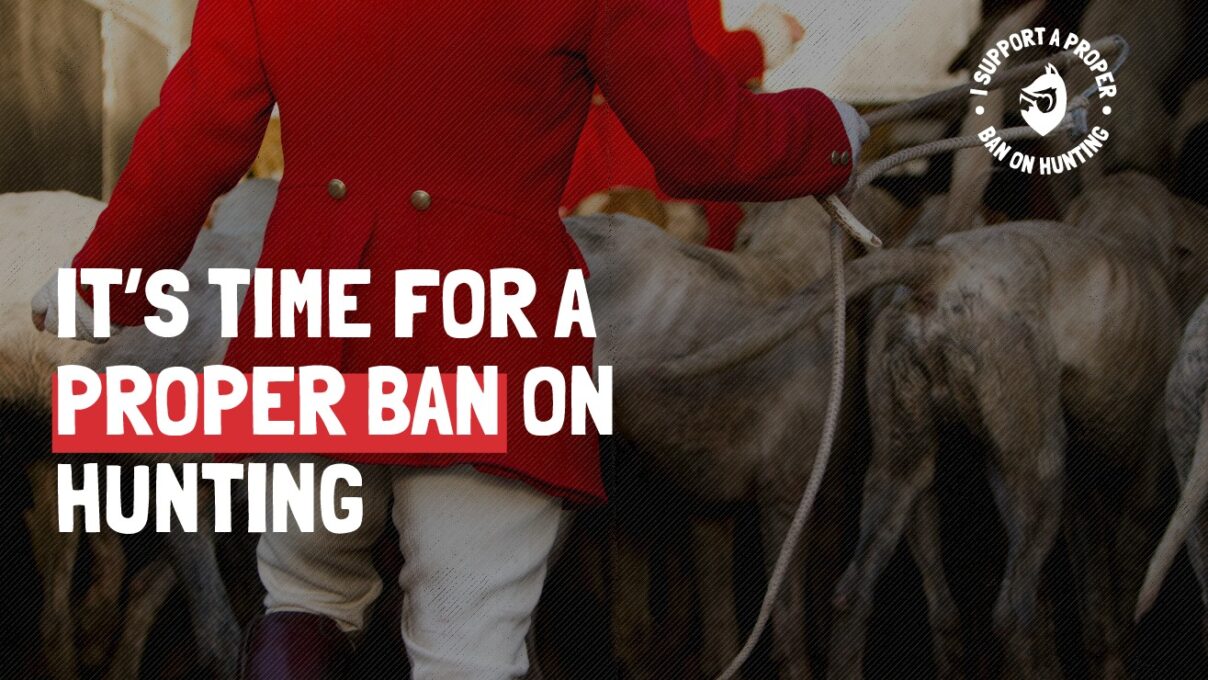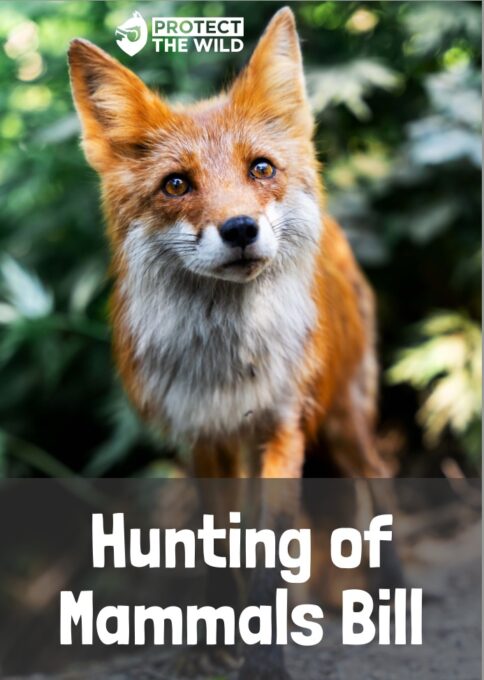Week in, week out, Protect the Wild reports on foxes being murdered, hunt staff harassing monitors or being violent towards them, hounds causing havoc on public roads, and more. Most hunts get away with all of this with total impunity. Why? Because of exemptions and loopholes written into the Hunting Act 2004 as it passed through Parliament.
But we have a solution, and we need your help to make it happen.
The majority of campaigner groups and organisations – including big names like the League Against Cruel Sports, RSPCA, PETA and Animal Aid – are calling for the Hunting Act to be strengthened. Protect the Wild also used to campaign for this; it’s why we were initially founded as Keep the Ban.
But we have changed our stance, and are campaigning for a much bigger outcome. We don’t want to reform the Hunting Act; we want it scrapped completely and replaced with a new law: the Hunting of Mammals Bill. Inspired by Scotland, which recently passed its own Hunting With Dogs Act, we know that legislative change is possible.
Protect the Wild argues that we need a multi-pronged approach in order to abolish hunting once and for all. We need watertight new legislation, which we will go into below, but we also need pro-wildlife politicians in government to make such legislation pass.
Why not strengthen the Hunting Act?
We see time and time again how hunt staff get away with hunting under the guise that they’re carrying out a lawful activity known as trail hunting (which is where packs follow an artificially-laid scent trail instead of a fox). Whether the police actually believe this is the case or not, it gives forces and landowners the excuse not to take action against hunts. And even if the police do decide to investigate and prosecute a hunt, the Crown Prosecution Service (CPS) then needs to prove that the hunter in question set out to actually kill a fox that day. This requirement to prove intent makes convictions hard to come by. Because of this, the CPS drops cases when it feels the likelihood of conviction is low.
Loopholes such as these were written into the Hunting Act by pro-hunt members of Parliament. Protect the Wild argues that these loopholes and exemptions have changed a straightforward piece of legislation banning the hunting of wild mammals with hounds into something far more uncertain and malleable.
Campaigning for the Hunting Act to be strengthened will give the same pro-hunting politicians the opportunity once again to ensure that the law will remain tenuous. We can not give them the chance to derail animal welfare legislation yet again.

Hunting of Mammals Bill
Commissioned by Protect the Wild and prepared by lawyers at Advocates for Animals, we are campaigning for the Hunting of Mammals Bill to become law. This comprehensive piece of legislation, which would become the Hunting of Mammals Act when passed, would spell the end of fox hunting in England and Wales.
Our legislation ensures that there are no grey areas: if you intentionally or recklessly hunt a mammal using one or more dogs, you are breaking the law and will be prosecuted. This is different to the current law, which – as we have previously explained – is all about intent. Hunting recklessly can include:
“whether the person failed to take reasonable steps to control a dog which is hunting a wild mammal,
whether the person took such steps as were reasonable in all the circumstances to avoid hunting a wild mammal,
whether reasonable efforts are made to control a dog which a reasonable person would consider, in the circumstances, is likely to be hunting a wild mammal…”
Under this legislation, if a judge was doing their job properly, a hunt would find it very difficult to walk from court without a conviction. This reckless clause will also ensure that hunts get convicted not just for hunting foxes, but for killing family pets, for worrying livestock, for trespassing on railway lines, and for causing havoc on busy roads.

Enforcement powers
Under the Hunting of Mammals Bill, police would have powers to search a person or a vehicle, as well as any devices that a person owns, such as a mobile phone. As we saw with the case of notorious hunter Ollie Finnegan, Leicestershire Police’s searching of his phone provided crucial evidence, forcing him to plead guilty. Finnegan bragged about hunting a “brace” of foxes in incriminating WhatsApp messages. The police’s actions were a one-off, though, and we don’t usually see hunters’ phones or computers being seized to search for evidence. The new legislation would make this a more routine police practice, and would give them powers to enter hunters’ homes in order to gather evidence.
The law would also give a local authority in England or Wales the power to begin prosecution proceedings for any offence under this Act.
Hunts can be prosecuted, not just individuals
A key part of our proposed legislation is to ensure that hunting organisations themselves are prosecuted for hunting foxes. Currently only individual hunt staff – usually the huntsman – are prosecuted for criminal activities of the whole hunt. Since the Hunting Act came into force in 2005, we have only ever seen one company, the Heythrop Hunt Ltd in December 2012, being prosecuted. The hunt pleaded guilty to four charges of illegally hunting with foxes, but the case was only successful because the prosecution was brought by a persistent RSPCA, not by the police and CPS. Since then, as far as Protect the Wild is aware, there have been no other successful attempts to prosecute a hunt as a whole entity.
Under the legislation, both the organisation and relevant individuals, such as company directors, secretaries and other officers, as well as the usual hunt staff on the ground, are liable to a prison sentence, a fine, or both. On top of this, the convicting court can confiscate an individual’s dog or horse used to carry out a hunting offence, and it can seize vehicles. If it sees fit, the court can also disqualify an individual from working with or using animals for any purpose, including hunting. This would, effectively put criminal huntsmen out of a job with future hunts. Under the current Hunting Act, all too often we see convicted huntsmen skipping from one hunt to another with impunity.
Prosecuting land owners
Like the Hunting Act, the Hunting of Mammals Bill has a provision for the prosecution of landowners if they knowingly permit trail hunting or real hunting on their land, or if they own a dog that has been used by hunters.
Until now, there has only been one attempted prosecution of landowners under the Hunting Act, in early 2023. The case was dropped against Duncan and Verity Drewett due to a series of apparent errors by Wiltshire Police and Wessex CPS.
When all hunting loopholes are removed from the legislation, we would see more attempts to prosecute landowners, because unlike now, cases that go to court are likely to be successful.
We need your support!
Our proposed Hunting of Mammals Bill can be made a reality, but we need all individuals to make their voices heard. Realistically, Protect the Wild is pessimistic that this current Tory government will make any efforts to amend (or scrap) the current Hunting Act or would pass more robust legislation. The older generation of Tory politicians with a desire for bloodlust are either retiring or dying, and younger, though, and more wildlife-friendly ministers will no doubt take their place – but more importantly, governments change and policies change with them.
Hunting is an archaic bloodsport that has no place in modern society. Younger generations in England and Wales won’t stand for men in red coats getting their kicks out of such brutality. Fox hunting will be consigned to the history books – we have no doubt about that – but we all need to work together to make that happen as fast as possible. Together we can end fox hunting for good.
To read the Hunting of Mammals Bill, click here.
To sign our petition calling for a proper hunting ban through the implementation of the Hunting of Mammals Bill, click here.
- Feature image Hull Wildlife Protectors


